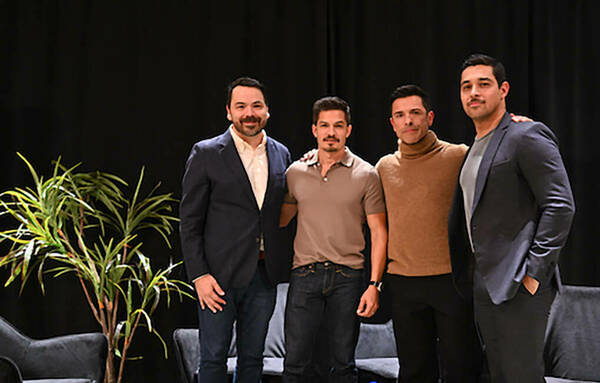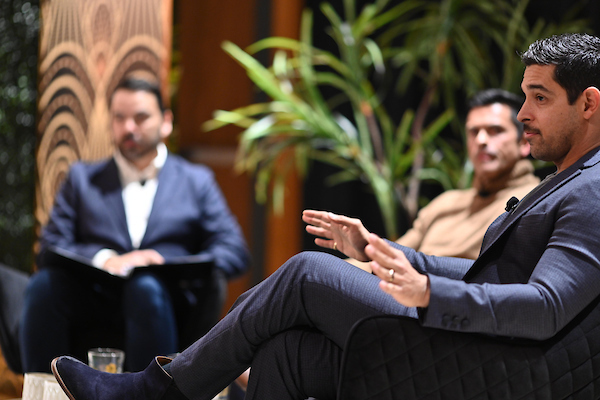
It’s not uncommon these days to turn on the television, launch a streaming service, or go to a movie and find Latino actors embodying a variety of leading and supporting roles. But, three prominent entertainers say, it’s not common enough.
Mark Consuelos, Nicholas Gonzalez and Wilmer Valderrama spoke to the Notre Dame community Nov. 2 at Transformative Latino Leaders in Hollywood: Actors, Producers, Change-Makers, a panel sponsored by the Institute for Latino Studies. Jason Ruiz, associate professor and chair of American studies, moderated the event. Ruiz teaches the course Latinx Representation in Hollywood, and he commended the panelists for helping to transform an industry that has historically excluded Latinos and Latinas.
While the trio acknowledged that it’s gratifying to see growth in the number of speaking roles — approximately 5 percent from 2007 to 2022, according to the Annenberg Inclusion Initiative at the University of Southern California — portrayed by Latinos. However, they aren’t yet satisfied with the level of inclusion present in the entertainment industry.
So what does satisfaction look like? For Valderrama, he’ll know his work is done when his daughter – now 2½ years old – grows up in a world where “inclusion” and “representation” are no longer needed conversations. Ideally, he said, she won’t even know what the words mean because they will be the standard. And it’s this vision that drives his efforts to further increase the breadth and depth of stories being told.
“I’m going to give myself like 10 to 15 years to change the entire game,” said Valderrama, who is of Venezuelan and Colombian descent. “What I can tell you right now is that we have a roadmap, we have the infrastructure, we have the talent and we have the interest. When I’m no longer on the earth and she’s in a world where she feels like she’s part of the majority and then she also uplifts the next minority, that is what inspires me.”
> Watch the video of the panel discussion. (Password-protected for Notre Dame students, faculty and staff only.)
More than 250 students, faculty, staff, and visitors turned out to listen to the actors talk about their experiences in Hollywood — in front of and behind the camera.
Opportunities for actors of color have changed over the years, the men noted. No longer are they relegated to stereotypical roles like drug dealers, violent criminals, or the Latin lover; nor are they competing with other underrepresented minorities to secure the singular ethnic, or non-white, sidekick role in a story.
For Texas-native Gonzalez, his Mexican heritage was never something that he saw as a hindrance to being successful. “I didn’t realize I was a minority until I went to Stanford [for college]. I didn’t know I was really different until then,” Gonzalez said. “It was obviously an obstacle in some ways, but I’ve always approached this as: I have something to offer, something you don’t. Value. Maybe it was ignorance in the beginning and not knowing that I should’ve felt differently, but I feel my growth and upbringing in San Antonio affected that. I didn’t feel like there were limits.”
Consuelos similarly credited his upbringing for helping him make it in the business. “My folks were immigrants,” said Consuelos, born to an Italian mother and a Mexican father. “They just wanted me to be better than them. It’s a burden, but a gift, to be here in the ‘land of opportunity’ to really fight. That’s what I did. There are definitely people way more talented than me who have quit, and I just haven’t quit.”

As a result of the actors’ hard work and studios loosening their preconceived notions of what types of people can play certain parts, Consuelos, Gonzalez, and Valderrama have earned key roles in a number of commercially successful projects.
Consuelos, along with his wife, Kelly Ripa, serves as co-host of ABC’s morning talk show “Live with Kelly and Mark.” He previously worked with Ripa on the ABC soap opera “All My Children” and, in 2007, the two created the production banner Milojo Productions. Consuelos also portrayed the character Hiram Lodge for five seasons of the CW show “Riverdale” and most recently appeared in season two of Hulu’s “Only Murders in the Building.”
Gonzalez is best known for his portrayal of Dr. Neil Melendez in ABC’s “The Good Doctor.” He debuted as medical student-turned-boxer Alex Santiago in the Showtime series “Resurrection Boulevard” and is currently starring as Capt. Levi Delgado on NBC’s sci-fi series “La Brea.” Notably, he also was cast as Young Conrado in the first drama series ever to air on broadcast television featuring a Latino cast, PBS’ “American Family.”
Valderrama has starred in the last six seasons of the CBS police crime drama “NCIS.” He is also reprising his role of Fez in Netflix’s “That ’90s Show,” a successor to the Fox sitcom “That ’70s Show,” and voiced the character of Agustín Madrigal in the Disney animated feature “Encanto.” He is currently developing a TV series based on the Disney Western “Zorro” for Disney+.
More Latino experiences and actors are waiting in the wings, ready for their chance to be featured on screen and present a more accurate view of diversity in the U.S. Notre Dame students with an interest in writing, directing, producing and other industry professions were encouraged to be a part of the solution in increasing representation. It’s especially crucial on the heels of the writers’ and actors’ strikes, Gonzalez said, when studios are cutting back on staffing in diversity, equity and inclusion offices as one way to recoup losses incurred during the industry shutdown.
“It’s our time now as a community. You’re going to be our storytellers. It’s up to you. We can build quality stories. We have such a rich culture and story,” Consuelos reminded the students in attendance. Together, he said, they can “put a dent” in the 95 percent of roles that go to non-Latinos.
Ruiz asked the panel what consumers can do to keep entertainment accountable to reflecting minority communities in a fairer or more modern light. It all comes down to the bottom line, according to Valderrama. ”They have to show up when they see a project that is championing what they want to be about,” he said, because studios will back the content if there’s an audience.
The Transformative Latino Leadership Lecture Series engages prominent figures in politics, entertainment, the arts, business, activism, the church, and other fields who present both their personal experiences and a vision of effective leadership in their sphere of influence.
“The purpose of this series is to bring major influencers who can speak to issues important to Latino communities to help our Notre Dame community be fully informed,” said Luis Fraga, ILS director and the Rev. Donald P. McNeill, C.S.C., Professor of Transformative Latino Leadership. Previous speakers include Oscar winner Rita Moreno, civil rights leader Dolores Huerta, U.S. Supreme Court Justice Sonia Sotomayor and U.S. Housing and Urban Development Secretary Julián Castro.
Paloma Garcia-Lopez, associate director of the Institute for Latino Studies, added: “The Institute advances the understanding of one of the fastest growing and youngest populations in the United States and in the U.S. Catholic Church. Our work strengthens the University of Notre Dame’s mission to prepare transformative leaders in all sectors of our society.”
Originally published by at diversity.nd.edu on November 13, 2023.